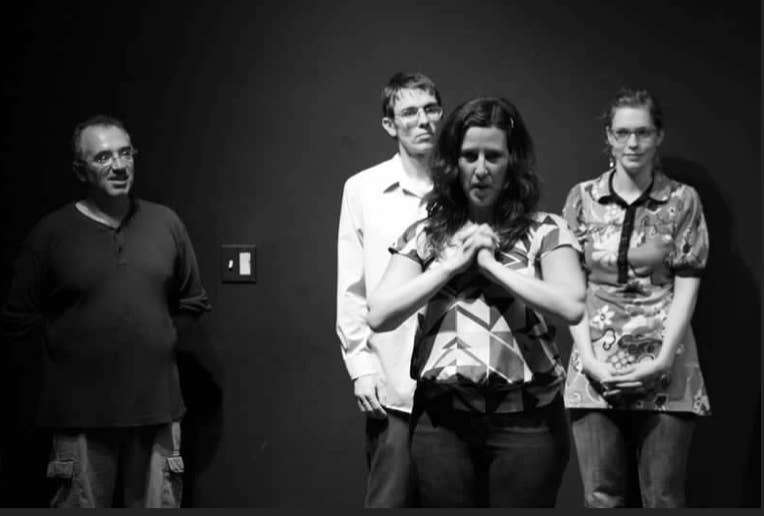Kizz the Lizard

Pan Theater Awkward Show - 2009
article by Doug Kassel (Copyright, 2003)
Doing the obvious is sometimes the hardest thing to do in an improv scene.
Lest you think the title refers to a sexual double- entendre of some sort of Carlos Castaneda/ Don Juan metaphysical mushroom-eating hallucination, let me define the term, “Kiss the Lizard.”
This term was born one night in a class, during the performance of a fairy-tale opera.
The princess had to free the prince from a reptilian curse with a kiss.
The woman playing the princess was getting caught up in the ecstasy of the moment and finishing her big aria. Her eyes were closed and she was in another world. All she had to do was finish her song and kiss the lizard, and then everyone in the class could go home.
I looked at my watch; saw there were only five minutes left in the class, and started thinking to myself as she was singing, “Kiss the Lizard.” I started to say “Kiss the Lizard” softly, and proceeding to repeat the term, gradually getting louder and louder, as the rest of the class joined me in what became a chant…”Kiss the Lizard! Kiss the Lizard!”
Eventually, the princess took the hint and did what needed to be done and the story resolved happily ever after.
“Kiss the Lizard” became a regular side-coaching term to use when anyone was stalling, avoiding, waffling, negotiating, or, in any way, not getting to whatever comes next.
It’s interesting that even though the improviser’s role is that of a storyteller, we sometimes shy away from that which will progress the action, “up the ante” or conclude the story.
Often audiences more clearly see where a scene needs to go than the player.
I’ve seen scenes struggle because players won’t use any of the options before them.
No information is being given and no action is being taken. I call it “Circling the Airport.” The scene is in the air and looking for a place to land, but no progress is being made.
It is interesting how scenes of confrontation can fall flat when the players accept a stalemate by not being willing to follow through on their goals.
In the example of an “I’m leaving you” scene, very often an ultimatum is followed by a lengthy discussion and no action. If one party has reached the point of ending the relationship and the other is being non-responsive, dismissive or argumentative, why keep the scene/relationship going? I’ve asked actors, “Why don’t you leave?” and gotten responses like “Can I do that?” and “Then the scene will be over too soon and he’ll be onstage all by himself.”
There’s a difference between abandoning your partner and doing what needs to be done. Being left alone on stage can actually help end the scene by showing someone’s real reaction to what just happened. Does he cry, get drunk or immediately call an old flame?
Do what you would do in real life! If you don’t leave, what is keeping you there? If you don’t want someone to leave, what are you prepared to do to keep him or her there? The “Kiss the Lizard” in this case, would be to at least attempt to leave and find out the consequences of that action, rather than avoid taking action at all.
If you open a door in a scene either literally or figuratively, or in life for that matter, you must go through it. If you just stand in front of the door and talk about going through it, then nothing has happened and you won’t get to the “what comes next.”
I’m reminded of the story of Elaine May auditioning with actors for “The Compass Players” in Chicago in the 1950’s. The actors were told that they were to improvise a scene where they were to go into the bar and pickup the girl.
The actors would sit down and try to make witty small talk and Elaine would say, “Let’s go back to your place.” If they continued the audition, trying to be funny instead of getting up and leaving with Elaine, they weren’t considered.
The actors got confused, because they didn’t expect the lizard to be kissed so quickly and without a fight. They were probably more focused on “doing well” than on listening and reacting to the moment, two essential skills for any improviser (and actor).
Viola used to constantly coach us “Show us, don’t tell us.” One of the meanings of that is to do it, rather than talk about it. Whether you might jump out a window or try to kiss someone, it is better for the scene to act on the impulse and then deal with the consequences, rather than discuss “what if?”
Doug Kassel, November, 2003. Note this article may NOT be reprinted without express permission of the author. To request permission please email pantheater with the article name and author’s name.